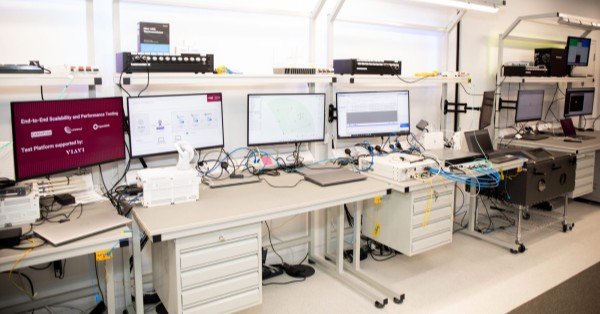Alcatel Submarine Networks (ASN), the optical submarine division of telecoms vendor Nokia, has just opened Europe’s largest private industrial 5G network in Calais. This epic project boasts 59 small cell antennas covering a spectacular 50,000 square meters and is set to revolutionize production for ASN across France.
The Finnish company has provided the network infrastructure and successfully partnered with Iliad, a mobile operator, Free Pro–both of which are part of the Iliad Group–in addition to Sopra Steria and BSCA from France, both industry-leading Industry 4.0 integration consulting services providers.
Although there’s no mention of it in the press release, Iliad’s involvement suggests that some spectrum from a public operator is being used. French regulator Arcep has begun to open up 3.8-4.0 GHz for private 5G networks as well, and Nokia has already been involved with early enterprise-owned private networking projects occurring throughout France.
After an intensive two-year process, Nokia successfully installed and integrated the small cells. This development covers 11 buildings with 57 indoor emission points as well as two outdoor emission points that extend to the loading docks.
ASN’s Industry 4.0 initiative is a groundbreaking effort to revolutionize its industrial processes, boost operational performance and enhance the work environment for employees. By integrating virtual and real domains in procurement, logistics, production, and maintenance along with other areas of business operations, ASN aims to use Industrial IoT practices and applications as part of this ambitious endeavor – which Nokia will be helping them achieve from the start.
At the unveiling of this network, representatives from all parties were invited to view the five exciting showcased items. These included digitalizing industrial processes (“dematerialising of all procedures”), laser sensors on cable storage tanks for fill-level management (“availability monitoring”), an energy usage tracking system within factory buildings ( “energy resource optimization and control,” connected glasses used for remote maintenance assistance in workshops, and predictive maintenance (“analysis of production issues regarding different equipment”).
ASN proudly boasts 700,000 kilometers of optical submarine networks all over the world- enough to traverse around the globe a total of 17 times! A statement declared that 5G would add an extra layer of security and speed to industrial processes. Thanks to its capability for automatic data collection and IoT integration, it enables predictive algorithms which support faster production management as well as streamline cable storage in factories – a significant challenge.
























